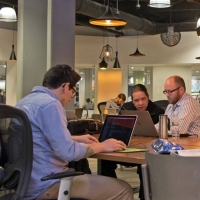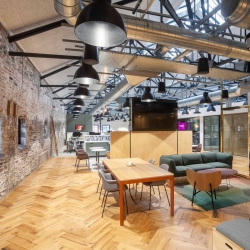To provide the best experiences, we use technologies like cookies to store and/or access device information. Consenting to these technologies will allow us to process data such as browsing behaviour or unique IDs on this site. Not consenting or withdrawing consent, may adversely affect certain features and functions.
The technical storage or access is strictly necessary for the legitimate purpose of enabling the use of a specific service explicitly requested by the subscriber or user, or for the sole purpose of carrying out the transmission of a communication over an electronic communications network.
The technical storage or access is necessary for the legitimate purpose of storing preferences that are not requested by the subscriber or user.
The technical storage or access that is used exclusively for statistical purposes.
The technical storage or access that is used exclusively for anonymous statistical purposes. Without a subpoena, voluntary compliance on the part of your Internet Service Provider, or additional records from a third party, information stored or retrieved for this purpose alone cannot usually be used to identify you.
The technical storage or access is required to create user profiles to send advertising, or to track the user on a website or across several websites for similar marketing purposes.
 Over four in five (83 percent) HR professionals across the UK say that hybrid working is essential in attracting the best talent, according to a new survey from flexible workspace operator IWG. The poll of 500 UK HR professionals suggests that benefits like hybrid working, which give employees a better work/life balance, are crucial for attracting talent. Almost two thirds (64 percent) of HR professionals have experienced applicants turn down a job because of a lack of wellness benefits such as flexible working and exercise options. More →
Over four in five (83 percent) HR professionals across the UK say that hybrid working is essential in attracting the best talent, according to a new survey from flexible workspace operator IWG. The poll of 500 UK HR professionals suggests that benefits like hybrid working, which give employees a better work/life balance, are crucial for attracting talent. Almost two thirds (64 percent) of HR professionals have experienced applicants turn down a job because of a lack of wellness benefits such as flexible working and exercise options. More →











 Employees with full autonomy to choose where they work are happier in their job, yet only one in five are currently able to do so. And though 60 percent of all employees prefer hybrid working, only 39 percent are able to flexibly split their time between the home and office. This is according to Jabra’s 2022 edition of the
Employees with full autonomy to choose where they work are happier in their job, yet only one in five are currently able to do so. And though 60 percent of all employees prefer hybrid working, only 39 percent are able to flexibly split their time between the home and office. This is according to Jabra’s 2022 edition of the 




 Research from
Research from 
 Predicting behaviours in the commercial property market is never an easy thing, yet we know that the pandemic has drastically altered this market. Whilst some players have advocated ‘the end is nigh’ for all office space, research shows a different picture emerging – namely the office space as we know it is evolving into something different. The impact of prolonged uncertainty has fuelled change. However, there are other forces at work shaping a brighter and more varied future for office space.
Predicting behaviours in the commercial property market is never an easy thing, yet we know that the pandemic has drastically altered this market. Whilst some players have advocated ‘the end is nigh’ for all office space, research shows a different picture emerging – namely the office space as we know it is evolving into something different. The impact of prolonged uncertainty has fuelled change. However, there are other forces at work shaping a brighter and more varied future for office space. 
 Over the past year, organisations experienced an increase in problems related to finding information, resulting in greater reliance on knowledge and information management tools than in previous years, according to a new survey by
Over the past year, organisations experienced an increase in problems related to finding information, resulting in greater reliance on knowledge and information management tools than in previous years, according to a new survey by 
 The
The 









March 6, 2023
The six skills managers will need for the future of work
by Lea Kimpele • Comment, Flexible working, Technology